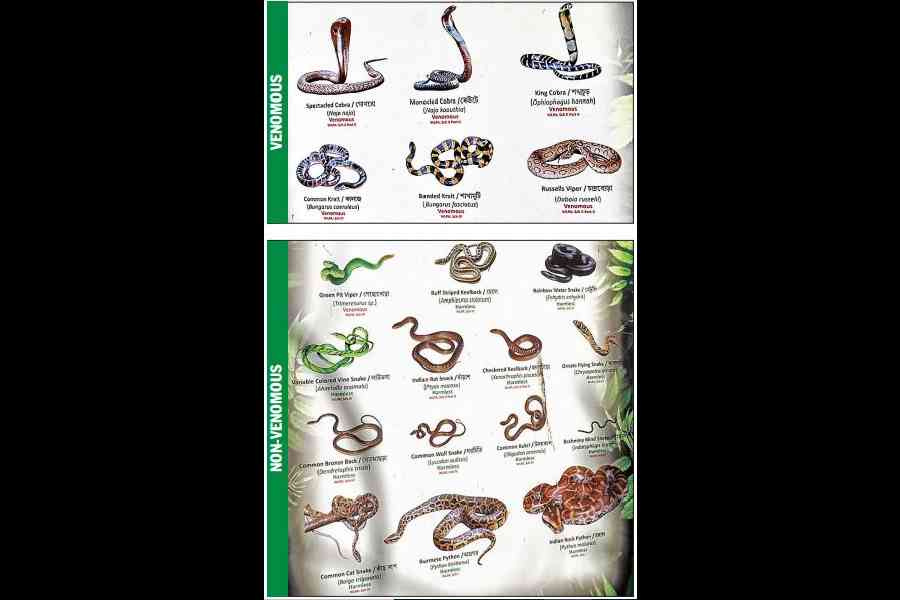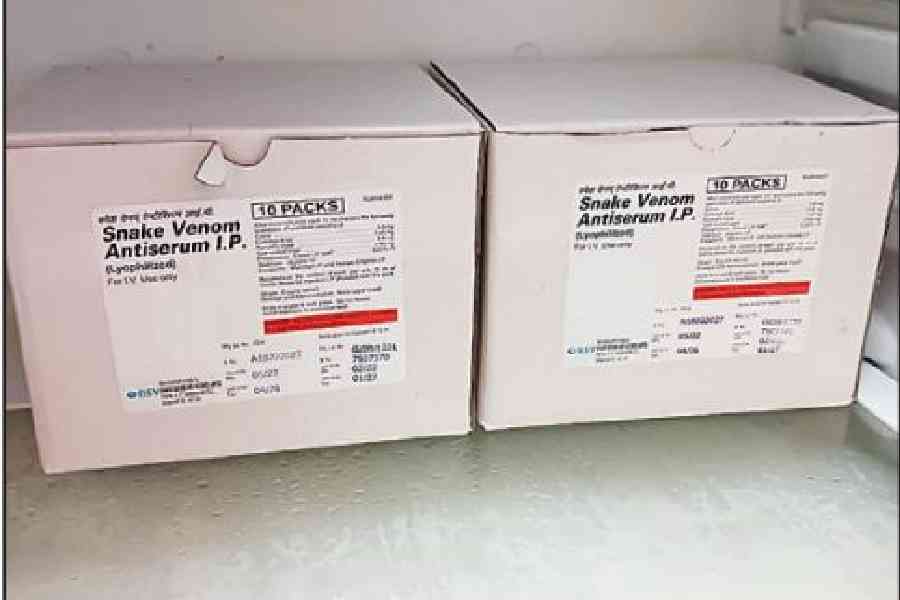A residential complex in New Town has taken it upon itself to safeguard its residents in the eventuality of a snakebite. Elita Garden Vista, in Action Area III, has purchased vials of anti-snake venom serum which needs to be administered to people bitten by poisonous snakes.
Sighting of snakes is common in New Town, especially in summer and monsoon, as there are grassy empty plots and waterbodies in plenty. Elita Garden Vista has had Common Krait (Kalaj) and Russel’s Viper (Chandrabora) entering the complex on at least four instances in recent times. In one case, a snake had entered the bathroom of a ground floor apartment in Tower 4.
A doctor has taken the initiative to purchase the anti-snake venom serum on behalf of the complex’s residents’ welfare association. Explaining the investment, Arunangshu Chakraborty, a resident who is a consultant in anaesthesia and critical care at Tata Medical Center, said: “If any one in New Town gets bitten by a snake, to rescue the person and take him to the nearest heathcare facility would mean a journey outside New Town, which may take 45 minutes or more.”
A delay of an hour in a snake bite can be nearly fatal, he pointed out.
The urban health and wellness centres, which are the only government heath facilities in New Town, do not stock this serum as they are not open round the clock and treating a patient with snakebite requires hospital admission.
“We are creating a snake bite kit, which will come to use irrespective of the breed the snake may be of. Other than the serum, the kit contains intravenous channel, saline bottles, etc. Everyone has been informed where the kit has been kept,” Chakraborty said.
The initial dose is 10 vials of antisnake venom serum. “It has to be administered by infusing with 300ml of normal saline within one hour. In some cases, like in Russell’s viper bites, even 20 vials might be needed,” he said.
The protective measure is possible as the housing complex, with over 1,750 apartments, employs a full-time male nurse ever since it set up a Covid isolation centre with oxygen support at the height of the pandemic, after the department of health and family welfare issued a guideline allowing NGOs and resident welfare associations to run isolation centres.
Chakraborty, who has experience in training paramedical staff at the School for Skills in Allied Health Services in Suri under the National Skill Development Programme, had himself trained the nurse.
For the anti-snake venom kit, he received the protocol from a friend working with snake venom in Shibsagar in Assam, an area infested with snakes. Elita has purchased 20 vials. The total cost of the kit came to Rs 17,000.
“No private chemist will keep such an expensive antidote which has limited shelf life and hardly any buyers. The serum expires in five years. We are looking at the bill as our life insurance for five years,” smiles Chakraborty.
The anti-snake venom first dose can be administered even at the victim’s residence while preparing to transport him or her to a hospital, he added.

SLITHERING NEIGHBOURS: A chart put up by the forest department at Banabitan in Central Park. Picture by Sudeshna Banerjee
The problem has not caught attention since, as Chakraborty points out, snake bite is a village problem. “In the villages, around this time people walk with sticks. But we are urban-minded. We are not equipped to protect ourselves against snake bite.”
Snake bite: Where to go
Reckjoani Rural Hospital, which can be reached along the road next to Eco Park Gate 4, stocks ASV but snake bite patients taken there are usually referred to RG Kar or Nilratan Sircar Medical College and Hospital after infusion and preliminary treatment. The hospital closest to New Town where full treatment is available is Bidhannagar Subdivisional Hospital in Salt Lake.
“There are four main types of venomous snakes found in Bengal — monocled cobra (Keute), spectacled cobra (Gokhro), Russell’s Viper (Chandrabora) and common krait (Kalaj). The ASV is a polyvalent one that works against all snakes found locally,” said Partha Pratim Guha, hospital superintendent. The first 10 vials have to be infused within an hour. “In some cases, a patient might need up to 40-50 vials,” he added.
“If there is a delay in the patient’s treatment, in case of haemotoxic poisoning, there is a risk of kidney failure, for which dialysis would be needed. For neurotoxic poisoning, there is damage to the brain and the heart. Monocled and spectacled cobra venoms are mostly neurotoxic. Chandrabora’s is haemotoxic,” Guha said.
According to Guha, of all the snakes, Kalaj is the most dangerous. Its poison has both neurotoxic and haemotoxic features. Its bite causes no local pain or swelling, one might not even find the bite mark. It might take 36 to 48 hours for features to be apparent. There might be atypical presentations — only knee pain or only stomach pain,” he said. Kalaj, he said, mostly bites people sleeping at night on the floor without mosquito nets.
“The person might not even feel it. A day or two later, he might feel stomach pain or start vomiting or feel knee pain. So for unknown bites, we have to observe the patient for at least 48 hours.” The subdivisional hospital has treated many snake bite cases, of which several have been from Rajarhat and even the added areas of Salt Lake.
“Most snakes are non-poisonous. Even for poisonous snakes, it might be a dry bite if it doesn’t get the time to inject venom.” The dosage of anti-snake venom is the same for both adults and children, added Guha, who used to impart training on snake bite treatment during his earlier postings in Howrah and Hooghly.
Snake bite: What to do
Tying a tourniquet near the bite site is strictly advised against.
“This practice of tying the leg or arm tightly to stop blood flow to the rest of the body is wrong. It only aggravates local damage at the bite site. And later when the doctor releases the tight binding, the blood gushing out at high pressure might harm the heart,” says herpetologist Anirban Chaudhuri, who has worked with the snake incubation programme at Alipore Zoological Gardens in the past.
The best way to deal with a snake bite is to not tie the site at all and reach the hospital within 20 to 30 minutes. If the hospital is really far away, say a drive of an hour or more, then a pressure bandage might be applied, which is done by tying a crepe bandage or a paar of a sari in a way that a wood pencil can easily slip through. It should be neither too tight, nor too loose so that blood flow is slowed down, not stopped altogether.
The first hour is vital. “If the gap from the bite time to needle time is less, the doctor has more time to treat the patient. The greater the delay, the damage becomes irrecoverable,” Chaudhuri said.
Snake sighting: What to do
Do not hurt the snake. If it has strayed into your house or inside your housing complex, inform the Wild Animal Rescue and Transit Facility Centre in Salt Lake.
“We get lots of calls from the Shukhobrishti-Uniworld City side of New Town. The snakes spotted are mostly Russell’s Viper, Monocled or Spectacled Cobra or Rat Snake (Dnarash). The last one is non-poisonous. We have received about 200 calls in the last two months and made close to 100 rescues. Awareness camps were conducted for Metro Railway workers in February-March when they reported lot of snake sightings in New Town,” said Manoj Kumar Josh, range officer in charge of the centre.
The rescued snakes are kept for observation at the centre in AE Block for a while and then released in the forests of Jhargram, Burdwan or Bankura or wherever suitable.
